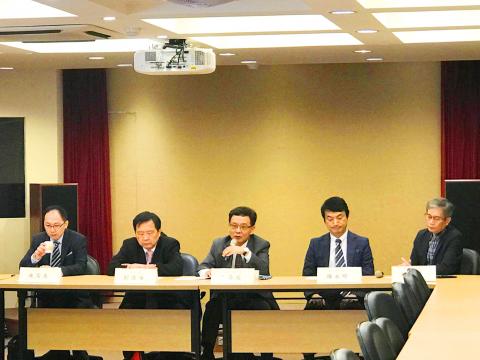National Taiwan University (NTU) yesterday expressed its strong objection and regret over the Ministry of Education’s decision the previous day to not approve the appointment of Kuan Chung-ming (管中閔) as school president.
NTU said in a statement that it had adhered to regulations throughout the election process, contrary to the reasons cited by the ministry for not appointing him.
Deputy Minister of Education Lin Teng-chiao (林騰蛟) on Friday cited conflict of interest as the main factor in the ministry’s decision not to confirm Kuan’s appointment.

Photo: Peng Wan-hsin, Taipei Times
Lin was referring to Kuan serving as an independent director on the board of Taiwan Mobile (台灣大哥大) during the election while Taiwan Mobile vice chairman Richard Tsai (蔡明興) was on the NTU president election committee.
Regarding whether NTU would accept the ministry’s decision and start a new election process, it only said that it would “act in accordance with the law” once it receives a written notice of the decision.
Minister of Education Wu Maw-kuen (吳茂昆) on Friday said the ministry would step in if any legal issues arise in the new election process.
Kuan had breached NTU regulations by not disclosing his role as an independent director at Taiwan Mobile while Tsai was sitting on the election committee, he said.
It is now up to the committee to verify the conflict of interest and decide whether Kuan should be nominated again, Wu said.
Kuan, who was scheduled to take office on Feb. 1, has declined to comment on the decision.
Wang Fan-sen (王汎森), former vice president of Academia Sinica and one of the candidates for NTU president who lost to Kuan, said in a text message on Friday that he would not run for school president.
Another candidate, former National Tsing Hua University vice president Wu Cheng-wen (吳誠文), also said that he would not run if the election process is marred by controversy and outside intervention.
The NTU student council has called for the implementation of “much-needed reforms” and has urged the school administration not to wait until a new president takes office.
The proposed reforms include introducing more gender-friendly facilities and clarifying the regulations pertaining to renting out the school’s gym and sports facilities, the student council said.

INVESTIGATION: The case is the latest instance of a DPP figure being implicated in an espionage network accused of allegedly leaking information to Chinese intelligence Democratic Progressive Party (DPP) member Ho Jen-chieh (何仁傑) was detained and held incommunicado yesterday on suspicion of spying for China during his tenure as assistant to then-minister of foreign affairs Joseph Wu (吳釗燮). The Taipei District Prosecutors’ Office said Ho was implicated during its investigation into alleged spying activities by former Presidential Office consultant Wu Shang-yu (吳尚雨). Prosecutors said there is reason to believe Ho breached the National Security Act (國家安全法) by leaking classified Ministry of Foreign Affairs information to Chinese intelligence. Following interrogation, prosecutors petitioned the Taipei District Court to detain Ho, citing concerns over potential collusion or tampering of evidence. The

TRADE: The premier pledged safeguards on ‘Made in Taiwan’ labeling, anti-dumping measures and stricter export controls to strengthen its position in trade talks Products labeled “made in Taiwan” must be genuinely made in Taiwan, Premier Cho Jung-tai (卓榮泰) said yesterday, vowing to enforce strict safeguards against “origin laundering” and initiate anti-dumping investigations to prevent China dumping its products in Taiwan. Cho made the remarks in a discussion session with representatives from industries in Kaohsiung. In response to the US government’s recent announcement of “reciprocal” tariffs on its trading partners, President William Lai (賴清德) and Cho last week began a series of consultations with industry leaders nationwide to gather feedback and address concerns. Taiwanese and US officials held a videoconference on Friday evening to discuss the

NEGOTIATIONS: The US response to the countermeasures and plans Taiwan presented has been positive, including boosting procurement and investment, the president said Taiwan is included in the first group for trade negotiations with the US, President William Lai (賴清德) said yesterday, as he seeks to shield Taiwanese exporters from a 32 percent tariff. In Washington, US Trade Representative Jamieson Greer said in an interview on Fox News on Thursday that he would speak to his Taiwanese and Israeli counterparts yesterday about tariffs after holding a long discussion with the Vietnamese earlier. US President Donald Trump on Wednesday postponed punishing levies on multiple trade partners, including Taiwan, for three months after trillions of US dollars were wiped off global markets. He has maintained a 10 percent

PERSONAL DATA: The implicated KMT members allegedly compiled their petitions by copying names from party lists without the consent of the people concerned Judicial authorities searched six locations yesterday and questioned six people, including one elderly Chinese Nationalist Party (KMT) member and five KMT Youth League associates, about alleged signature forgery and fraud relating to their recall efforts against two Democratic Progressive Party (DPP) legislators. After launching a probe into alleged signature forgery and related fraud in the KMT’s recall effort, prosecutors received a number of complaints, including about one petition that had 1,748 signatures of voters whose family members said they had already passed away, and also voters who said they did not approve the use of their name, Taipei Deputy Chief Prosecutor